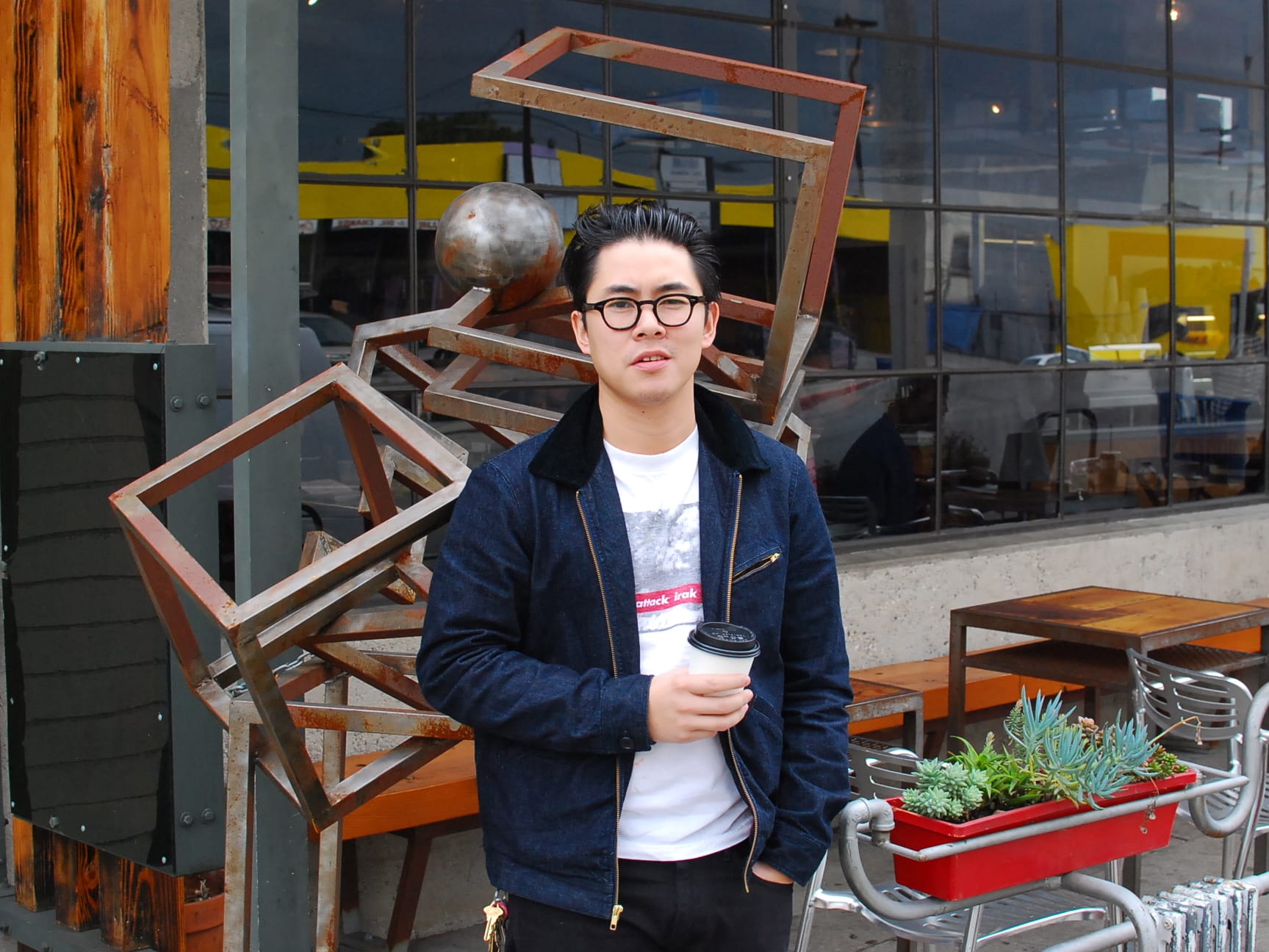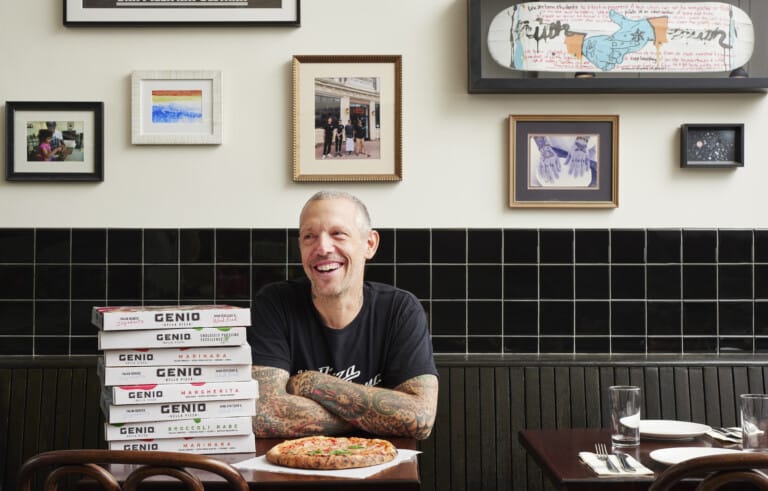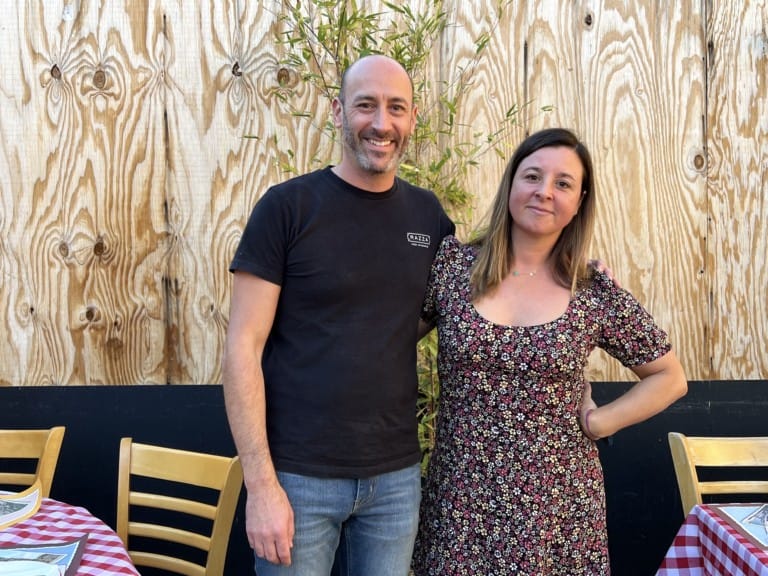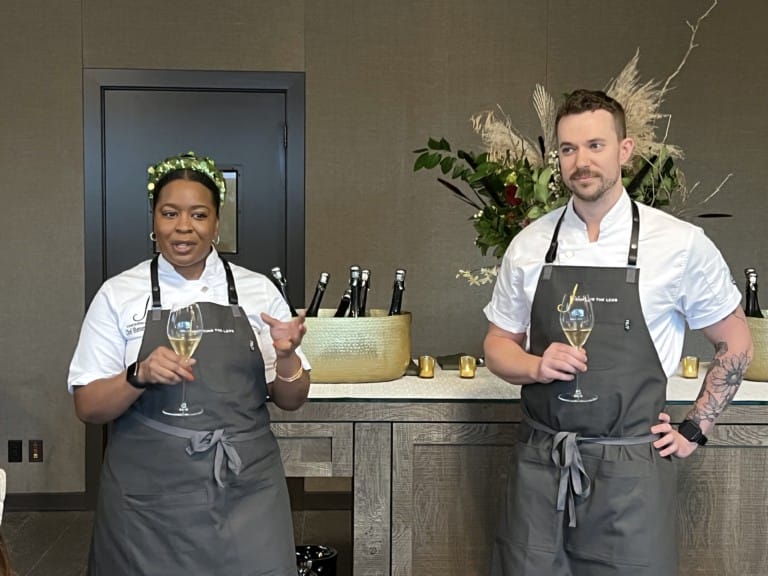INTERVIEW CONTINUED FROM PREVIOUS PAGE
What will it take for you to consider Night + Market a success, if you don’t already?
On the one hand, I consider it a success because it’s way more than I ever imagined it would be, because I’ve gotten to do things like go to New York to cook, and do things like writing for magazines I like. As I got more serious about doing it, it became – and this wasn’t by design – but it became more of an ethnographic thing. I was as interested in telling people about this stuff as I was in just being a restaurant, like doing demos. When I did the [Los Angeles] Times demo at that event this year, that’s something I never really imagined, but it’s become important for me to be able to talk about this mortar pounded chile paste, which for me is super important. To a lot of people, no one cares. It’s one of these really not-so-exciting things that I find really exciting. I’ll consider it a success when I can talk about this stuff more, and more people know about it, and when more people know about the differences between Northern and Northeastern, for instance. It’s two-fold, because the other part of me is super simple. All I want is to have a place where people can drink beer and have this food.
I sort have come to resent the full-on geek mentality of food, people who don’t grow up with this food becoming authorities on it and sort of having big arguments about it. That doesn’t really interest me, to have a full-on seminar about this stuff. How can it be a part of your life in a more visceral or tactile way?
You used the word “ethnic” before. What do you think of when you hear that word?
I don’t know what I think about it, because I use it a lot. At the same time, I’ll read stuff…it was Roy Choi who wrote something, maybe on his blog – about food not being ethnic food. He was trying to make the point that it was more than “ethnic food.” Part of me cares about semantics and part of me doesn’t. On the one hand I’m an ethnic restaurant because I do everything the way an “ethnic restaurant” does it, and I do it super authentic and traditional. It’s one of those things. People have a really hard time considering things in a vacuum. If you just had the food and didn’t know where you were – if you didn’t know you were on the Sunset Strip – you may think you were somewhere else. You might think you were in Thailand, or Thai Town, or on the Eastside. People can’t divorce themselves from that. People are in a certain atmosphere, they automatically feel it’s authentic or valid.
The other part of me thinks we’re not an ethnic restaurant because I care about the ethnographic endeavors, because I care about talking about them, I care about having a platform to talk about stuff. It’s not just a neighborhood café, which it also is. It’s both.
Do you feel like being a photographer helps you at all in being a chef?
Not just being a photographer, but having a background in the arts, studying film, it’s a really good education for doing anything. I was always one of those people who studied things, not necessarily thinking I’d go into that field. Some people study film because they want to make movies for the rest of their lives. For me, sometimes over the summer, when I was younger, I’d go to SMC and take a class in economics because I was interested in it, and I thought it would help inform my vision, or all that knowledge would help me do what I wanted to do. Accounting is something I’ve unsuccessfully tried to study. I’ve tried to take accounting courses. I’m so bored with it, but I know it’s something I want to know better and more intimately. Film is one of those things where part of me did want to do film, and part of me just wanted a solid education and it seemed like an interesting thing to do. Initially I was a photographer, and the idea of studying photography for four years at a really expensive school on the East Coast seemed too decadent for me, and too one-dimensional. With film, there was always more to study. You could study location sound. You could study writing. You could study producing. There’s a lot more to work with than just taking pictures. It ended up being a really good education. On the one hand, I’m sort of bummed out, because I’ll watch a show like “Girls” on HBO, and it’s my favorite show, and all the people in the credits are my classmates, literally from my year, that I was in class with. They were always way more positive and successful and proactive about making student films. Most of my friends were in the music department. I always did stuff the hard way. They told me to do things a certain way, and instead of just listening and doing that, I always took the roundabout way. That’s always been the story of my life, but I’m totally happy with where I ended up. I’m happy with the background and the education does help me in that, I think about things a lot more in terms of context, why people eat this way. It’s as important for me to cook this food as it is to really push this style of eating. Festive, communal eating, which is the way people eat in the Thai countryside, or the way people might eat in the French countryside. It’s not so much, “I’ll have this dish, and my wife will have this dish.” It’s looser.
What’s your favorite part about running restaurants?
I think it’s figuring out things that are interesting to me, like this theme of lost food items, lost wines, forgotten things, and making them happen and making them important to people. I enjoy, to a certain degree, the day-in, day-out running of the restaurant. I enjoy working with my hands, touching, cutting things, grilling things. I really like that. It’s second nature, but I spend as much of my day sitting and thinking about stuff. Not every day, but some days, because I prep – everybody does prep, including me – so some days I’ll sit and slice 50 pounds of pork jowls, and that will be that day. The next day, I won’t slice anything and will be thinking about something or writing. The past couple weeks, I’ve been working on this article I’ve been writing for this magazine, and that’s been a big part of my schedule. Every facet sort of interests me. In a way, I enjoy meeting people that come in, and the people I’ve met because of my restaurant, has been pretty awesome. At the same time, I’m not the most sociable guy who’s out in the dining room chatting people up. I rarely do that. I’ll have one good night a month where I’m out in the dining room saying hi to people. Usually it’s really tough for me. I’d rather be in the kitchen. At the same time, I’m excited about all the people I’ve gotten to meet, and the stuff I’ve gotten to do, people I’ve gotten involved with, and gotten to chat with, talked with. Like this thing on Sunday, that’s something that would have never happened without Night + Market.
Is there anything you don’t enjoy eating?
Yeah, there’s a lot of stuff. Not a particular dish or type of food, but I’ve really come to resent the sort of frat boy mentality that’s pervaded the food world, in terms of one upsmanship. It’s not different from two jocks high fiving over who banged what girls last night. Sometimes people – not so much right now – but in the past, people have come in and said, “What’s the weirdest thing you can cook for me?” It’s offensive to me because none of that stuff is weird to me. It’s just my food. That sort of exoticism or colonialism – “What can I eat that’s so weird that I can go report about or I can go talk about it?” – to show people. You wouldn’t want to eat that night in, night out, and that doesn’t make it less valid. I wouldn’t want eat sea urchin night in, night out. I love it. I’d eat it twice a week, I’d eat it three times a week, but not every night. There are certain things that people try where it’s like, “Oh man.” That octopus you can get in Korean restaurants that squiggles around that sticks to your tongue, I’m sure a lot of people love that. Old Korean dudes love that shit. They go and drink and love that. A lot of younger people, food enthusiasts, go, and are like, “Oh man, I had these squiggly octopus tentacles last night.” I’m like, “Was it fucking good? Did you enjoy it?” There’s always a pause. There’s always, “Well, it was interesting.” Wouldn’t you rather just have some really awesome fried chicken? When did that become such a bad thing? That sort of annoys.
Then people come in and say, “I really like spicy food. I want you to put me in pain.” A lot of the stuff I cook is definitely not the spiciest restaurant by any means, but it’s at a level I feel is appropriate. I’ve never wanted to be in a pissing contest about spice level, because sometimes – the whole thing with Thai food and every type of food – dishes should be prepared the way they’re supposed to be prepared. Something that’s supposed to be really, really sweet should be really sweet. Something that’s supposed to be really spicy should be really spicy…Whatever, it should be prepared the way it’s meant to be. Something that’s really fatty should be served fatty and not tame. It should be served really fatty. There are certain times people come in and will ask for a dish that’s not spicy and will be like, “Can you make that really spicy?” I could, but it would taste really shitty…Then again, startled pig is an inherently spicy dish, so yeah, I can make that spicier. It’s just doing what’s appropriate.
Do you it when they ask for something spicier?
Yeah, when they ask for something that’s not supposed to be spicy to be spicy, I’ll do the best I can with it. The pad Thai that I serve is a bare bones pad Thai that doesn’t have any meat in it, just tofu, sweet radish, bean sprouts, onions and those small dried shrimp. I put dried chile powder and peanuts on the side. You’re supposed to mix it. If someone wants that spicy, it’s like, pad Thai’s only supposed to be spicy to a certain level. It’s not supposed to be a really spicy dish. What do I do? I just put more chile powder on the side and you mix it in, and it throws it off balance, to me, so I do the best I can. Dishes that are supposed to be spicy, when people want them really spicy, I’ll do that all night, because it’s supposed to be.
The stuff I don’t like to eat, I don’t really go for super weird stuff. I always see people posting things online: “I just had Rocky Mountain oysters.” I would never really want to eat testicles, of any sort. That doesn’t appeal to me. The worst thing, the thing that I hate the most, is when people eat stuff like that, and they’ll say, “Oh, man, you can’t even tell it’s testicles.” Well, if you’re eating testicles, don’t you want to tell it’s testicles? It’s almost like you’re only eating it for the trophy aspect. When I eat liver, I like the taste of liver. I don’t want it toned down or anything, I want it to taste like liver. I don’t want to eat liver and have it taste like chicken breast. Otherwise, I’ll just eat chicken breast. If I eat liver, I want it to be funky and iron-y and strong and sort of pungent. That’s what I want. I always hate when people eat stuff and say, “I can’t even tell it’s liver.” You should celebrate that stuff.
It’s food as sport.
Yeah. It’s like frat boy stuff.
Do you have a very first dish that you remember cooking in your lifetime?
The most important thing in cooking is learning how to season right, which basically means learning how to put enough salt in something, balancing things, how to exercise restraint sometimes. One of the first things I “cooked” – I’m such a salt fiend – when I was younger, I remember having a big thing of Pringles. They were so fucking salty – they were like sour cream and onion Pringles – I’d open it up and I was always worried that it wouldn’t be salty enough, so I’d take a salt shaker and shake in some salt, close up the lid and shake it up. It was so disgustingly salty, but I ate it, and that was my first food discovery. That was probably when I was four or five.
Another thing kind of like the Pringles – I had a babysitter who would feed me Ritz crackers, they were so buttery, and then she would put extra butter on them, like a dollop of butter. That’s the same thing as Pringles with more salt. I can’t help but think that influenced me somehow, because I really do have a more-is-more mentality.
Maybe get the two of those together, the buttery Ritz and the salty Pringles.
My sort of go-to meal when I was 10 or 11 – I was alone a lot because my parents had the restaurant – sometimes my grandpa would babysit me, but he didn’t know how to cook or anything, and he was old. He was just there as supervision. I would cook myself, and I would make boxed macaroni and cheese, and then fry up some pork chops. That was my meal. That’s what I ate a lot.
Thai food, if there’s something I best at, it’s cooking larb or things along those lines. That was probably the first Thai thing I learned to do. I was probably eight or nine, at the restaurant, learning to eat spicier foods, learning the balance of things.









Blog Comments
Jane
December 14, 2012 at 3:11 PM
Excellent interview, Josh! Covered many topics from interesting food to photography influences to Pringles. Good read.
Joshua Lurie
December 14, 2012 at 3:45 PM
Thanks, Jane. Kris clearly has a lot on his mind. You’d like Night + Market since you’re such fans of Thai food and have actually traveled across Thailand.